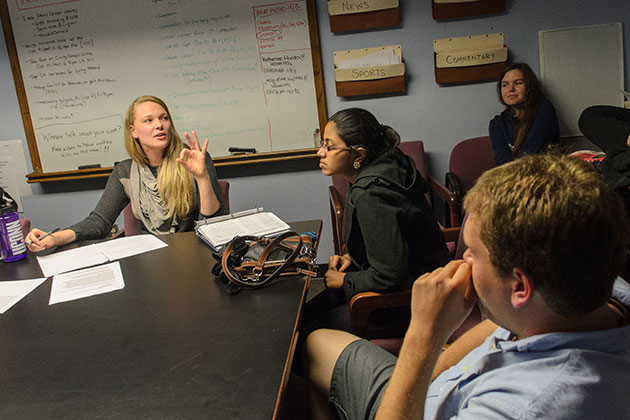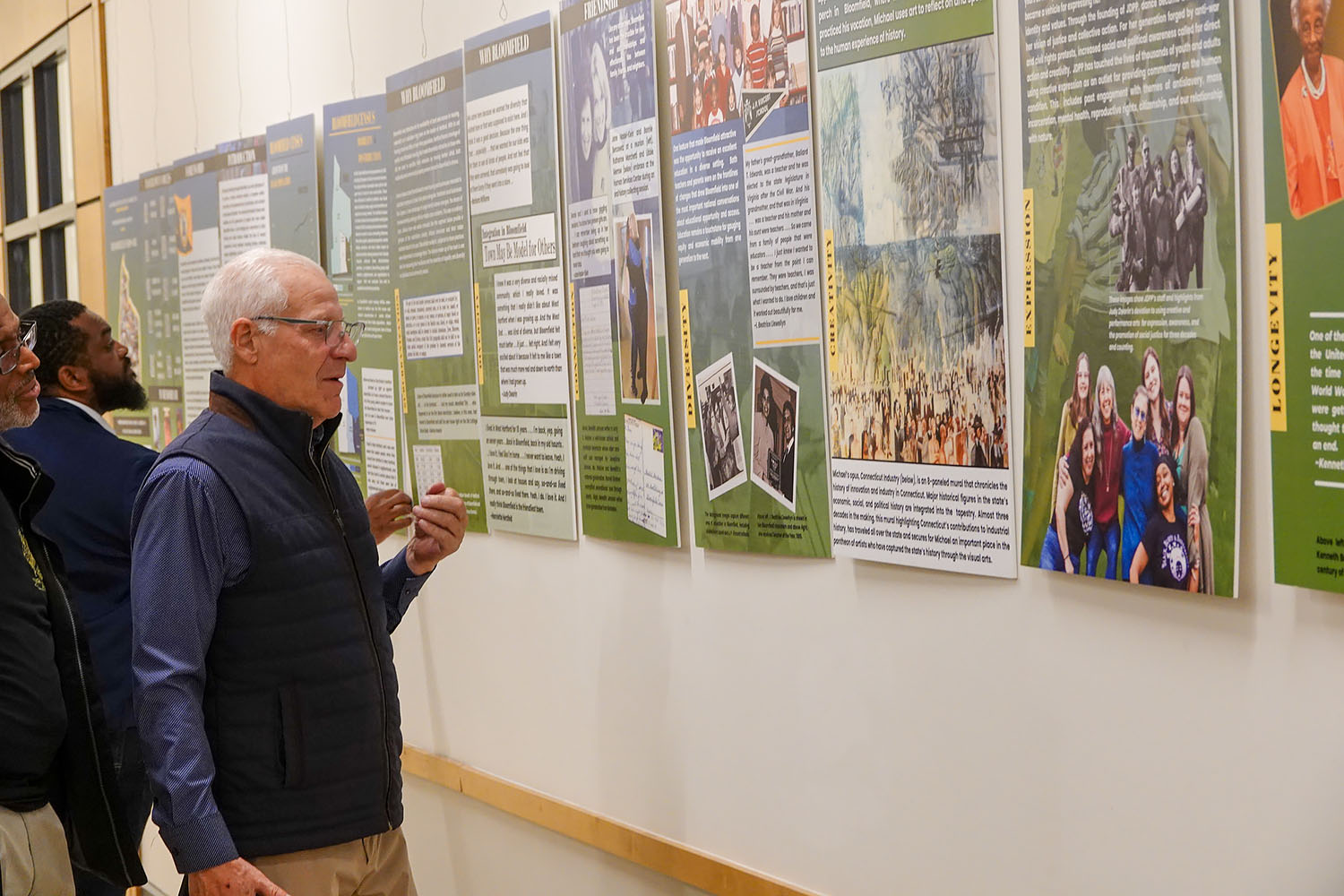
One day late in September, The Daily Campus learned that a plan to bring an additional 2.2 million gallons of water per day to the Storrs campus had received an important state agency approval. As the associate news editor for the student newspaper, Jackie Wattles ’14 (CLAS) knew the water plan was a major issue that needed to be covered for the next day’s paper.
With most student reporters already working on assignments between their classes and studies, it is not unusual for an editor at The Daily Campus to begin gathering the information necessary to write a timely story that needs attention, so Wattles started making calls to pursue to the story. What is unusual is that in addition to having responsibility as an editor at the newspaper and working to fulfill academic requirements as a double major in journalism and political science, Wattles is also a member of the women’s volleyball team – practicing, competing, or traveling to games almost every day – and she still wrote a story that appeared on the front page of the next day’s paper.
“I was running between classes and practice while on the phone walking and trying to jot down notes, trying to remember quotes,” says Wattles. “It gets crazy, but I love the craziness. It makes it interesting.”

All students struggle with managing their time and priorities when first arriving on campus, with student-athletes having to carve out the time for their additional team obligations each day. Wattles seems to have taken it to a higher level, says Huskies head volleyball coach Holly Strauss-O’Brien, who recruited Wattles out of Liberty Hill, Texas, where she was a two-time First Team All-District middle blocker. Last season, Wattles registered 102 kills for the Huskies.
“Jackie is an all-in, all-the-time person. One thing Jackie is not afraid of is hard work,” Strauss-O’Brien says. “She has always had a love for volleyball, and in college her passion for journalism really developed. Being an athlete and on a team your entire life, you learn so many invaluable lessons, from how to manage people, communication skills, time management, pressure and stress, to leadership skills. She is an extremely organized young woman with a relentless drive and desire to be the best she can be in every facet of her life.”

Wattles says she has always been interested in public policy issues, especially local government concerns, which led her to combine her interest in journalism and political science with a minor in environmental economics and policy. After her freshman season as a student-athlete in the fall of 2010, Wattles spent her second semester using her newly found free time to explore other opportunities on campus, asking questions about student organizations and other activities. She decided to enroll in a newswriting class because although she enjoyed writing in high school, her school did not have a student newspaper.
“I was just so enamored with my classes and loving what I was learning,” Wattles says of her experience in the newswriting class, which ultimately led to writing for The Daily Campus following her second volleyball season. “It’s great to go out, write an article, give it to your professor, and have your class read it. I thought it would be even better to get out there and write for the school paper, get some experience, and put something on my resume. I did what I could. I’d pick up a few articles a week, and I fell in love with it.”
After writing general assignment stories, Wattles was asked if she would be interested in taking the responsibility of covering the Undergraduate Student Government (USG), one of the most challenging beats for a student newspaper, where budgets, issues, campus politics, and institutional priorities that affect all students are discussed at meetings.
“The meetings have a tendency to go late. Very passionate students get involved with USG. They deal with very important issues and tend to pick them apart. It’s very raw,” says Wattles, who spent this past summer as an intern at CTNewsJunkie, the online political news website that covers Connecticut government and political issues. “I think it’s interesting. I’m a nerd like that. I started covering those meetings, and the editors liked it.”

As her junior year drew to a close, Wattles was asked to consider becoming the associate news editor for The Daily Campus, a position that involves developing story ideas, assigning reporters to write stories, participating in weekly planning meetings, and helping to design the newspaper, including making decisions on what news will be on the front page. The editors agreed her passion and understanding of news would benefit the newspaper, even with her busy schedule playing volleyball.
“The Daily Campus is really lucky to have someone like Jackie who can manage her time correctly, who is dedicated and that we know is going to give us the best story possible,” says Tyler Morrissey ‘ 14 (CLAS), managing editor of the paper. “Her intellectual curiosity really comes through in her stories. Even I’ll look at a story and not see much of a news angle, but she’ll go above and beyond to find news in something that would seem meaningless to most people. I read a lot of her stuff [at CTNewsJunkie] over the summer. I noticed since she’s done the internship, coming back she took whatever skills she learned there and applied it to her writing up here. The difference really shows.”
Wattles says the challenges faced by today’s newspapers, in the face of declining print circulation and the struggle to find profitability on the Internet, are not discouraging her from seeking a career in journalism. She says pursuing a graduate degree of some kind is important to her future job prospects as a journalist.
“You can’t take a class in journalism today without a professor giving you a warning that the world of journalism is changing. I’m really passionate about feeling that’s not a bad thing,” she says. “I think the web will certainly change the game and the way it’s played, but I also think that creates amazing opportunities. It’s an innate thing with me. I like the idea of being able to take complicated information that students should know because it affects their lives, and break it down in a way they will understand and motivate them to speak up about it or get involved. I guess it’s going to be my lifelong challenge to figure out a way to make information relatable to people, and put it in a way that makes them interested and shows them how it can affect them.”


